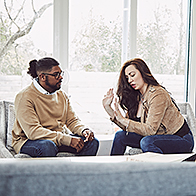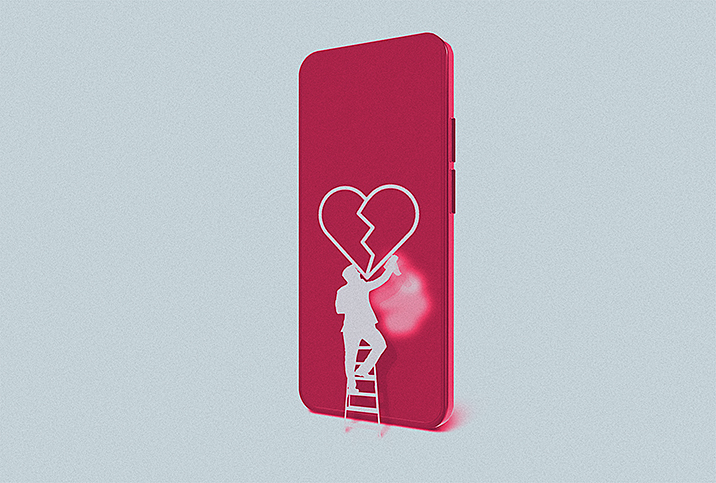Should I or Shouldn't I: Knowing When to Break Up

No experience is quite like a breakup. Whether you're in a casual relationship or a long-term commitment, it's difficult to sever ties from someone with whom you've formed a bond. However, knowing when to break up is necessary, rather than dragging out a relationship that's unlikely to succeed.
Make up or break up?
The inner aspects of a relationship are complex and differ from couple to couple, so what works for one partnership may not work for another. Therefore, it's important to learn what it looks like for you personally when a dynamic begins to fail.
"People get into cycles they can't get out of," said Wendi L. Dumbroff, M.A., a licensed professional counselor who has a private practice in Madison, New Jersey. "Underneath whatever goes on under top, underneath you see that same cycle repeating itself."
This doesn't mean either partner is faulty or bad, she clarified, rather the pattern itself is to blame.
The solution is to find the root of the problem. For example, Dumbroff said, if one party feels unheard, frustration may manifest through bouts of defensiveness and blaming, which exacerbate rather than extinguish the problem. Staying present and attentive in this scenario would go a long way toward solving the issue.
Deciding whether there's enough reason to break up depends on the couple's willingness to look at and work on themselves individually and together. You should consider breaking up if the healthy aspects of a relationship tilt toward unhealthy, according to Megan Kozak, M.Ed., director of Lighthouse Relationships, a psychology and counseling practice based in Brisbane, Australia.
Are we in love with each other? Are you willing to work on the relationship or do you want to let it go?
"Within Gottman Method Couples Therapy, there is a framework called the Sound Relationship House, which breaks a relationship into three core areas: the Friendship System—I feel known, loved and valued; the Conflict System—I feel safe and heard; the Shared Meaning System—I feel supported in my individual and couple goals," Kozak said. "Do a self-evaluation on those three systems and decide whether that part of the 'house' can be rebuilt or if it's time to move on."
Emily Rose Heard, a mind-body wellness coach at Menlo Park Psychiatry & Sleep Medicine in California who is completing her master's degree in integral counseling psychology, recommended asking yourself several questions to evaluate a relationship: Are we willing to compromise equally to meet each other's needs? Are we helping each other grow or holding each other back? Is our issue communication or abusive arguments?
To the list of inquiries, Dumbroff added: Are we in love with each other? Are you willing to work on the relationship or do you want to let it go?
Couples who have invested more, such as having multiple roles—best friends, roommates, sharing children, pets, belongings and property—will require extra consideration. There's more at stake, after all. Dumbroff emphasized the significance of prioritizing kids' needs to avoid unnecessary trauma.
Start by self-evaluating
Regardless of the relationship's longevity, breakups are emotional. Experts named guilt, confusion, sadness, anger and fear as the predominant feelings. Suppressing these negative emotions can be damaging over time.
"Our feelings are like a compass that points us toward a need," Kozak said. "Visualize how you would feel if you made a particular choice. What emotion bubbles up and what is that telling you about what you need?"
Both Heard and Dumbroff warned of the risk of staying in an unhealthy or unhappy relationship as a result of these feelings or other triggers.
"Anger is usually a secondary emotion, but underneath there's usually something much more vulnerable," Dumbroff said. "You have a very different conversation when speaking from vulnerability rather than from that place of anger. Either person can get triggered, and I think we all need to take time to pause because that gives us the opportunity to respond versus react."
Self-evaluation is a critical step in the breakup process.
"If you notice you spend more time stressing about your partner than enjoying them, focusing more on their needs rather than yours or generally feel underappreciated, it may be time to move on," Heard explained. "If you feel your relationship is healthy and supportive but stuck in a rut, breaking up may not be the best approach."
She recommended individual or couples therapy to repair the relationship or mediate a breakup. These modalities have extensively positive outcomes, especially concerning communication.
"Therapy can be a great way to support your relationship and learn skills to manage conflict, speak your needs and develop boundaries," Heard added. "[These are] tools that will help your current relationship or your next one if you choose to move on."
Couples wait six years on average to seek professional help, Kozak said. In that time, a monumental amount of damage can occur. Early intervention can prevent a lot of heartache.
"You don't have to wait until the relationship is collapsing or get into that space where it's so bad that we don't know what to do anymore," Dumbroff said. "That's the beauty of couples therapy: You're working with both of them to really understand what's going on inside and how that affects what happens between them."
Sometimes all people need is a bit of space to grow and regroup before reentering the relationship at another time, Heard noted. A breakup is a next step if a couple has exhausted all other avenues and found the cons outweigh the pros. Like a relationship, breaking up requires empathy, kindness and dedication.
Navigating breakup waters
Each expert emphasized constructive communication as the foundation for a healthy breakup. Heard recommended having a compassionate, in-depth discussion about the relationship's future and taking advantage of this opportunity to learn about your own vulnerability and strength without blaming yourself or the other person.
"I think it's really important to know that it's OK to seek help, that it's a strength and not a weakness," Dumbroff said. "So many people say, 'I should be able to do this myself,' but it's actually a lot harder to show that vulnerability. If there's something that's not going right, turn toward it and not away from it."
"In an ideal world, a breakup should never be a complete shock to the other person but rather the result of a series of mutually respectful conversations," Kozak said. "Where possible and safe, face to face is always preferred as it is really hard to read tone or facial expressions over the phone or via text. Sometimes we dehumanize people when we are feeling hurt and use a lot of criticism or defensiveness during a breakup. Remember that at some point, you liked or even loved this person and they deserve to be treated with respect, just as you do."




















